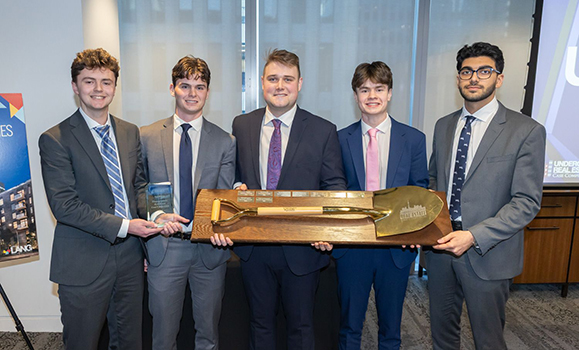Real estate developers spend years perfecting their plans for new projects. Imagine doing so in a month.
That's how long a group of five Dal students had to craft their pitch-ready proposal for a mid-town development in Toronto as part of an international real estate case competition last month.
The team rose to the challenge, towering over 13 other groups from North America and Australia — including competitors from the University of Toronto, Ohio State University, and the University of Texas at Austin — to become the first team from Atlantic Canada to win the annual Undergraduate Real Estate Case Competition.
While the cases are fictional, the competition's challenge reflects the real-world complexities of undertaking new development projects. Teams are judged on the physical, legal and financial feasibility of their proposals and how successful they are in pitching them to a panel of experts with experience in the sector.
There were some very late nights.ÌýWe're all extremely proud to win and represent Dal.
"There were some very late nights," says Greg Shannon, a fourth-year finance major on the team. "We're all extremely proud to win and represent Dal."
Greg and his teammates are all members of the , a student-led group of real-estate enthusiasts that brings speakers to campus regularly and chooses a delegation to attend the pitch competition in Toronto each year.

L-R: Greg Shannon,ÌýJosh Hatfield, Nolan Pace, Kyle Stammers, and Jaden Lawen.
A pivot-friendly planÌý
Members of the Dal team say their proposal stood out from the rest in one key way: it was centred on seniors. None of the other teams, including the Queen's University team they faced in the final, developed proposals aimed at addressing Canada's aging population.

"What we discovered was that seniors' living was undersupplied greatly in the Greater Toronto Area," says Kyle Stammers, an economics student on the team.Ìý
Their research showed existing housing for retirees in the area near Yonge and Eglington avenues where their case was situated tended to be very pricey, leading them to develop a project that could supply a more affordable option. They used a hybrid model for the development that would feature both seniors' living and multi-family units.Ìý
"I think that really sold it to the judges because it offered flexibility if there was a downtrend in senior living. We could pivot some of those units easily into multi-family or vice versa," explains Kyle.Ìý
Their proposal for The Nexus — a 896,381 square-foot dual-tower shown above right in a rendering — also included sustainble features for long-term efficiency, opportunities for community engagement, and green space, potentially making it more appealing to the existing community in the popular neighbourhood. Key financials and market competitors were all spelled out as were key selling points for the development, such as local transit, uregent care, and other amenities.
Working through uncertainty
Ìý
Commerce student Nolan Pace says he and other members of the Dal team collaborated well together and benefitted from a diversity of experiences and knowledge.
"The five of us all have had some significantly different backgrounds and different co-ops and job experiences to bring to the table," he says.Ìý"We all had different things we focused on but we all overlapped to make sure there weren't any gaps.
The team also included finance major Josh Hatfield and Jaden Lawen, a civil engineering student.Ìý
If there was any uncertainty, we came together to work through those kinks and it really showed in the final product.
"If there was any uncertainty, we came together to work through those kinks and it really showed in the final product," he adds.
Greg, who won a 2023 co-op student of the year award at Dal, says the judges — from industry leaders Mattamy Homes, Starlight Investments, and Deloitte — seemed to appreciate the team's thoroughness.
"We did an extensive amount of research into our products," he says. "We really backed it up with a lot of data and tapped into real-world issues."

